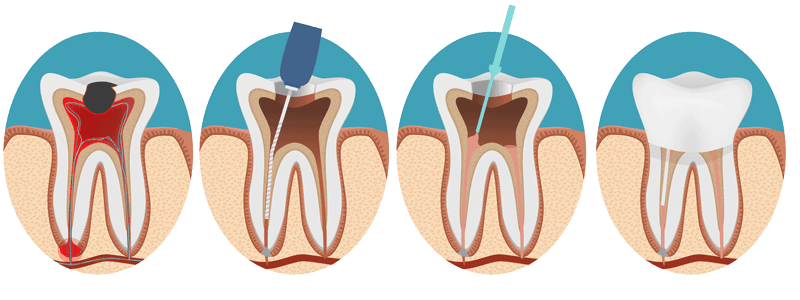Root canal therapy, also known as endodontics, is a vital procedure aimed at treating infection within the pulp of a tooth. The pulp, located in the root canal, is soft tissue containing nerves and blood vessels. Infections can occur due to dental decay, cracks, injuries, or faulty fillings, leading to serious complications if not treated promptly.
When the tooth’s pulp becomes infected or damaged, it can lead to severe pain, swelling, and even an abscess (a pus-filled pocket). If left untreated, this infection can spread to the surrounding tissues, causing more extensive problems and potentially leading to tooth loss.
Root canal therapy is designed to remove the infected pulp, clean and disinfect the root canals, and seal the tooth to prevent further issues. We are fortunate to have Dr. Negin Mosahebi, a highly experienced and skilled root canal specialist, as part of our practice, ensuring that even the most complex treatments are handled with the utmost expertise and care.

- Persistent pain when biting down or touching the tooth.
- Sensitivity to hot or cold temperatures that lasts longer than a few seconds.
- Swelling or tenderness near the tooth.
- Discoloration of the tooth, even without pain.
If you experience any of these symptoms, it’s important to consult with us as soon as possible to avoid more serious complications.
If a tooth is not treated, it may lead to increased pain and eventual tooth loss. Root canal therapy is often the only way to save a tooth with an infected or damaged nerve. While antibiotics can help manage infection, they do not resolve the underlying problem. In cases of severe damage, extraction might be necessary, followed by tooth replacement options such as dentures, bridges, or implants.
Initial Examination and Diagnosis: We use advanced diagnostic tools to assess the extent of the infection and plan your treatment.
Restoration: After the root canal, we place a filling or crown to restore the tooth’s structure and protect it from future damage.
For patients with dental anxiety, we offer sedation options to ensure a relaxed experience. Our goal is to provide effective, pain-free treatment, whether in one or two appointments.
Post-treatment: you may experience some discomfort as the anaesthetic wears off. It’s normal to have mild soreness or sensitivity for a few days. We recommend avoiding hot beverages until the numbness subsides and suggest taking over-the-counter pain relievers as needed. If discomfort persists beyond a few days, please contact us for additional support.
We understand that many people feel anxious about dental procedures. At Mona Lisa Smiles, we are committed to addressing your concerns with empathy and understanding. If you are nervous about your root canal treatment, let us know. We offer extended appointment times to discuss the procedure in detail and provide various sedation options to ensure your comfort.
If you suspect you need a root canal or have any questions about the procedure, we are here to help. Contact Mona Lisa Smiles today to schedule your consultation or to learn more about our root canal treatments. Call us at 0208 449 3411 or email us at info@monalisasmiles.co.uk
